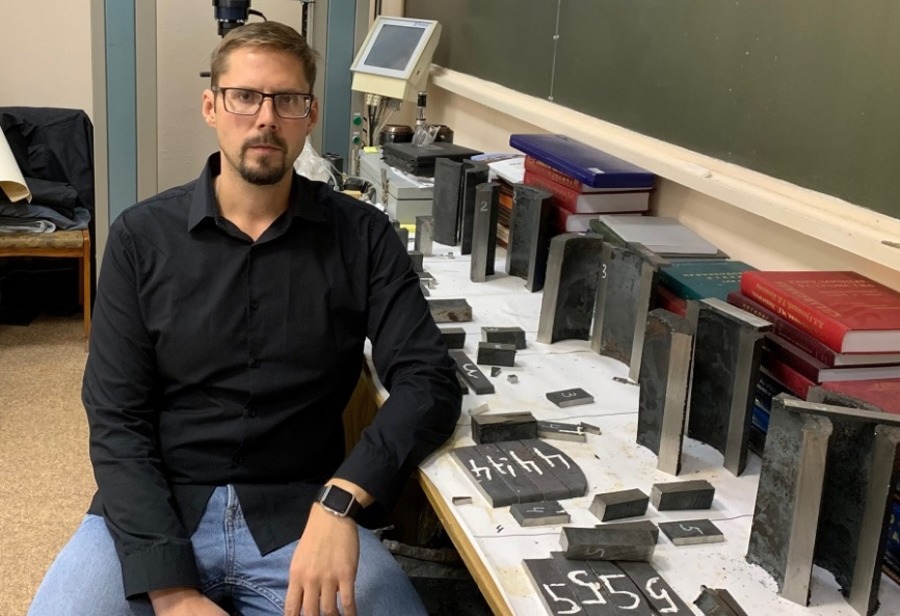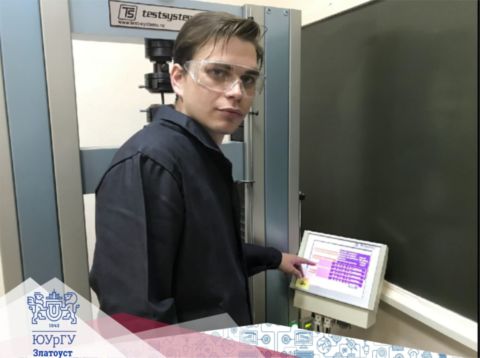A postgraduate student from South Ural State University has been awarded a grant from the Russian Foundation for Basic Research. The young scientist is working in a project on the "Modelling of Phase Composition to Develop the Principles of Creating Gradient Materials with Various Functional Properties". The work's main objective is to determine the conditions in which it is possible to create new materials by combining several materials, for instance, metal and ceramics.
A postgraduate student from Zlatoust and staff member of the Research and Innovation Services Vadim Sedukhin, under the guidance from a Candidate of Sciences (Engineering) and Associate Professor of the Department of Engineering and Technology of Materials Production, took part in a contest for the best research project. The young scientist has been awarded a grant in the amount of 1 million 200 thousand roubles for the fulfilment of his project. The financial support will help upgrade the laboratory for holding the experiments, as well as purchase the required equipment and materials. Earlier, the scientists had created a unit for studying the high-temperature interaction of materials. They note that it can be used to conduct experiments with 10 samples at the same time. To track the course of the experiments with more precision, a high-speed camera needs to be installed in this unit, so that the whole process could be captured. This will help study the process of creating a new composite material in detail, and determine the optimal conditions for achieving the desired result.
The necessity to create new composite materials can be explained by the fact that the operation life of each material is limited. A metal has certain parameters — heat resistance, for instance. There is a limit, to cross which it would be impossible without losing this property. Ceramics has a much higher index of heat resistance. It can withstand high temperature, but it is very brittle and will not bear shock loads. To obtain a material as strong as metal and as heat-resistant as ceramics, it is necessary to find the conditions, in which both ceramics and metal will interact.
"This is an interesting topic for me, or I wouldn't have engaged in it these past five years," says Vadim. "I should say that we're not the only ones who are trying to do that. Currently, many research studies on this topic are being carried out in Japan and other countries. For sure, some things are already well-known-of and well-studied, but others are only waiting to be discovered. We still do not know the whole specifics of the process, so we're trying to study it. Especially since the available modern equipment allows to do that."
In the process of work it is planned to involve not only the laboratory created at Zlatoust, but other scientific platforms as well: for instance, the Chelyabinsk supercomputers, and metal casting teaching laboratories of the Faculty of Materials Science and Metallurgy Engineering. The project implies blocks of mathematical and computer modelling, holding experiments at the micro level, as well as a global experiment with obtaining of big-size samples.

The project head Andrey Anikeev believes that the fact that the grant has been awarded to the young scientist confirms the relevance of the chosen field of research:
"This project is part of a big research. We have been working on it for quite some time now. The idea of creating such a laboratory where it would be possible to hold such experiments arose already back in 2011, and we were gradually approaching our goal, selecting the equipment. Vadim joined us in 2014, and since then he has been actively participating in the scientific life. The today's success is only logical. Though, really, it is a result and a beginning at the same time since the main work has only just begun."
South Ural State University (SUSU) is a university of digital transformations, where innovative research is conducted in most of the priority fields of science and technology development. In accordance with the strategy of scientific and technological development of the Russian Federation, the university is focused on the development of big scientific interdisciplinary projects in the field of digital industry, materials science, and ecology. In the Year of Science and Technology, it will take part in the competition under the Priority-2030 program. The university acts as a regional project office of the World-class Ural Interregional Research and Education Centre (UIREC).




